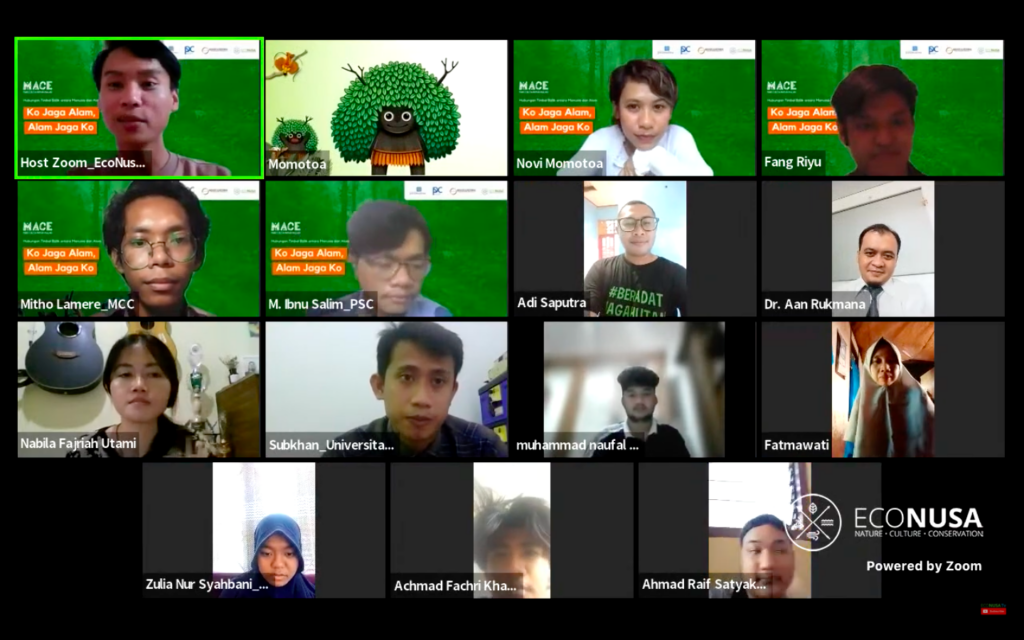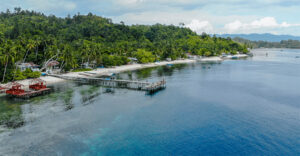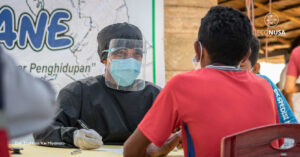
Covid-19 pandemic affecting around the globe from the last two years has marked the disharmony of man and nature. Man-made destruction of nature has been blamed for the emerging virus here. “Covid-19 reflects human greed to nature,” said Aan Rukmana, Paramadina University’s lecturer of Philosophy and Religion, as one of the speakers in MACE (Mari Cerita/Let’s Share) of Papua and Maluku stories entitled “Mutual Relation of Human and Nature” on Saturday, 12 March 2022. MACE was the collaboration of EcoNusa and Paramadina Social Care (PSC) and Paramadina University’s Khatulistiwa.
Aan said all environmental crises are owing to the man’s perspective to nature. There are two common perspectives today, namely modern and traditional perspectives. Modern perspective perceives all things more rationally. Nature is deemed a separate entity from human and thus human is free to study and examine nature.
Such perspective has been arising for centuries. In the 18th century, aufklarung movement emerged in Europe which gave major portion to man’s mind. “The movement made human with their mind could conquer anything including nature,” said Aan.
Read also: Young People, Key to Environmental Success in Namatota
As to him, the modern knowledge made human free to exploit nature. Moreover, the decision makers take in the destruction. It brings about consequences, and one of them is the Covid-19 pandemic affecting the world. “The nature slowly engages a counter attack to human,” said the Director of Paramadina Institute of Ethics and Civilization’s Cooperation and Development here.
The modern perspective here is different from traditional human belief. As to Aan, in traditional perspective, human relation with nature is more spiritual and profound. In eastern philosophy, for instance, human is considered as part of nature. This is reflected from the old Chinese paintings depicting that human is smaller than nature. “It shows that human is part of nature despite their outstanding prominence,” he said.
In traditional perspective, both human and nature are part of God’s creation. With their equal nature, their existence has complement to each other. Many indigenous communities in Indonesia still have strong belief to this perspective. For instance, Baduy Tribe in Banten bans the community to cut trees thoughtlessly given the fact that trees are parts of human existence. Bali community has a so-called tri hita karana perspective that serves as the guidance for man and God relation, man and nature, and man and their peers.
Read also: The Fate of Democracy and Environment are at Youngsters’ Hands
Man and nature relation also happens to the indigenous people in eastern of Indonesia. Novi Hematang, the EcoNusa’s Environmental Specialist, said that the indigenous people in Tanah Papua and Maluku Island has harmonious relation with nature. One of the instances is the community’s sasi as the local wisdom that bans the utilization of natural resources at a certain area at a certain period of time.
The nature guarded by the indigenous community does not only provide benefit to the locals but also to all mankind in the world. As to Novi, there are three aspects of nature, namely environment, social-cultural, and economy.
In terms of environment, nature has forest that serves as absorber of carbon produced by man and provides oxygen for breathing. Forest has vital role of climate balancer in the earth. In Indonesia, the largest forest cover lies in Tanah Papua and Maluku Island. Around 70 percent of Indonesia forest covers is in both regions which is then dubbed the last frontier. Both regions has the largest mangrove forest which serves as the breeding spot of various fish.
Read also: Raimuti Island, The Stunning Island is Sinking
In social relation aspect, man has close kinship with nature. In the eastern of Indonesia, there is a sort of emotional relation. The indigenous community considers nature as their mother that provides dwelling and food. Many stories passed from generation to generation tell the man and nature relation. Many places are deemed sacred due to the belief that there is noble value. “For example in Tidore, when there is a newcomer, prayer is performed and celebration is made to secure the newcomer,” said Novi.
In economic aspect, nature is the source of income. The community, particularly in eastern of Indonesia, earns their income from their farming such as clove, walnut, and nutmeg, and sea fish. The locals also utilized nature potentials by creating ecotourism to lure visitors.
However, the existing natural resources in eastern Indonesia has various threats. One of them is a large scale land-based investment such as logging and palm oil plantation. This causes the carbon sink on the trees released to the air. “Consequently, the earth is getting hotter which triggers natural disaster,” added Novi.
Read also: Now or Extinct, Not Late to Mitigate Climate Crisis
According to Aan, the best way to protect earth we inhabit here is by applying traditional and modern perspectives but not exaggerating them too much. Modern perspective is applicable but not all things could be rationalized. The traditional way is allowed, never consider all things be mystique so it could become myth. “To think too extremely that nature could hardly be touched will make us alienated from nature. Thinking too much confidently that we could conquer nature is not recommended, as crisis will occur,” he added.
Novi gave similar notion. As to her, defending nature does not mean we are not allowed to utilize the existing resources. Nature can be beneficial if it is managed in sustainable way. “Thus, our next generations could still enjoy nature as we have today,” she said.
Considering the arguments, as to Novi, EcoNusa provides training on creative economy to the indigenous people so they could earn extra income other than their sustenance for school tuition and health facility. The training is on making pineapple jam, sago powder, and nutmeg cultivation.
Editor: Leo Wahyudi




